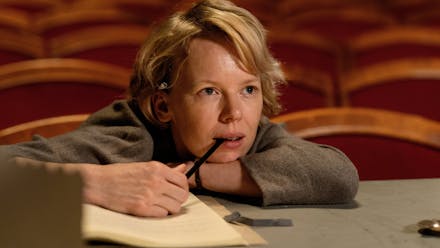For many of a certain age, Tove Jansson’s Moomin novels, cartoon strips and animated TV series have an emotional pull to rival that of Spangles and Space Dust. In fact, the Finnish author/artist created her magical — and deceptively layered — world at the close of World War II, having already gained some notoriety as an anti-fascist satirist and free-spirited member of the Helsinki artistic set.
Zaida Bergroth’s biopic — long-listed for Best International Film at this year’s Oscars — zeroes in on this period of Tove’s (Pöysti) career, split into three key acts/years: 1944, 1947 and 1952. With the creation of the Moomins an illustrative backdrop (somewhat on-the-nose parallels are drawn between Tove’s circle and her most famous characters), Bergroth instead focusses on Tove’s relationships; principally her strained one with sculptor father Viktor (Robert Enckell), all-consuming love for married theatre director Vivica Bandler (Krista Kosonen) and on/off affair with long-suffering left-wing MP Atos Wirtanen (Shanti Roney).
In choosing such a brief period of her life, the result feels more intriguing sketch than detailed portrait.
Bergroth — along with screenwriter Eeva Putro, production designer Catharina Nyqvist Ehrnrooth and cinematographer Linda Wassberg — creates a wonderful sense of Helsinki’s post-War period, a decadent, louche round of parties, affairs, private views and first nights. It feels achingly alluring as our own world starts to uncurl from 18 months of restrictions and fears. Undercutting this, though, is a constant note of melancholy, and these twin seemingly contradictory sentiments are balanced well. Tove’s restlessness, her unique worldview and her constant search for who she really is are compellingly portrayed.
Still, perhaps thanks to a brisk running time, we’re offered a not entirely nuanced examination of Jansson’s motivations (father issues/a broken heart/societal conservatism), and in choosing such a brief period of her life, the result feels more intriguing sketch than detailed portrait. Nonetheless, the ensemble cast are excellent, particularly Pöysti in her first lead feature role — utterly beguiling as the mercurial, passionate, unconventional artiste.
